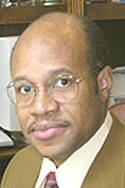Who Are We?
 |
| Dr. Errington Thompson |
I think it is important for us, as Americans, to try to come to grips with who we are.
Most Americans over the age of 20 can recall Roger Daughtry’s (lead singer for The Who) searing voice as he wailed, “Who are you?” Who are you? is also the theme music for the very popular drama CSI. As we look back over the first nine months of Barack Obama’s presidency, I think it is important for us, as Americans, to try to come to grips with who we are.
Thirty years ago, I think the answer was obvious. We were the good guys. We had just elected a new president, Ronald Reagan. If we didn’t know that we were the good guys, he was more than happy to tell us. Those other guys, the Russians, they were the bad guys. We were honest, law-abiding citizens. More importantly, there was a collective America. Everyone seemed to have the responsibility to make America better. From the janitor pushing a broom to the CEO in an Armani suit, we were all working to make America better.
Then something changed. The change probably started in the late 1960s
and early ’70s but it began to be noticed in the late 1980s. We stopped
working for us and began working for ourselves. By the late 1980s, the
new mantra was “Greed is good!” But in reality, it was good only for
the few at the top.
This can best be seen by looking at our major corporations. Throughout
the ’60s and ’70s most of them were good corporate citizens. It was
unheard of at the time for a corporation to move its operation overseas
and shut down plants here in the United States. That just wasn’t done.
Corporations paid a fair wage. In return, Americans bought American
products. Everyone profited.
Over the next 30 years, CEO wages skyrocketed. Corporate profits
ballooned to unimaginable levels and the investment crowd made billions
of dollars. Yet, wages stagnated. Where CEOs had earned 40 times as
much as their lowest-paid employees, now they made 400 times as much.
Corporations moved overseas in search of ever cheaper labor and
friendlier environmental laws. The Dow Jones industrial averages
doubled, tripled, quintupled and more in a short period of time, while
small towns withered on the vine. Huge sections of large cities like
Detroit, St. Louis and Baltimore became ghost towns. One income was no
longer enough to keep the family afloat. Now, we needed two incomes.
Even with two full-time working parents, household budgets are still
strained.
After almost two years of recession and an economic collapse which
started almost exactly a year ago, there is talk in Washington about
new regulations. Part of that discussion has to include talking about
who we are as a people. How should our corporations act?
Should they
act in the best interest of their stockholders? Should these large
corporations act in the best interests of America?
Sometimes the two
interests are not the same. Shouldn’t we expect corporations who hire
hundreds of thousands of Americans to act in our best interest?
We, as Americans, created an environment that made these corporations
successful. They didn’t appear because Samantha Stevens, the
beautifully seductive witch from Bewitched, twinkled her nose. Instead,
hard-working Americans helped these corporations meet and exceed their
goals. So, should we expect something in return – something more than
just a job?
I expect good corporate citizenship. We all should expect that. There’s
a reason why General Motors, IBM, Dow Chemical and other Fortune 500
companies did not arise in China, Mexico or Dubai. They arose here in
the United States because we created an atmosphere that was friendly to
business. Now, we need Congress to restore some of the balance that was
lost over the last 30 years.
• Corporations need to be taxed for sending things out of the
country and having them processed and then transporting them back here
for sale. These taxes need to make it prohibitively expensive to ship
jobs out of the United States.
• Secondly, corporations are not people. Congress needs to pass a
law stating that the rights of people should always usurp the rights of
corporations (this would seem obvious but this is hugely controversial
in the courts).
• Thirdly, Congress needs to pass health care reform that truly reforms the way healthcare is delivered in the United States.
• Finally, Congress needs to pass the Employee Free Choice Act. This makes it easier for people to unionize.
If we can get Congress to truly do this, we then create jobs. We
actually create better-paying jobs and a better lifestyle for all of
us. Only then can I answer the question — who are we? We are the same
as we’ve always been, a country of the people, for the people, and by
the people.







